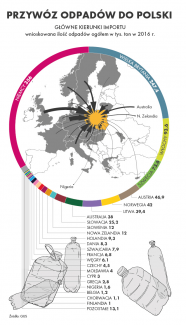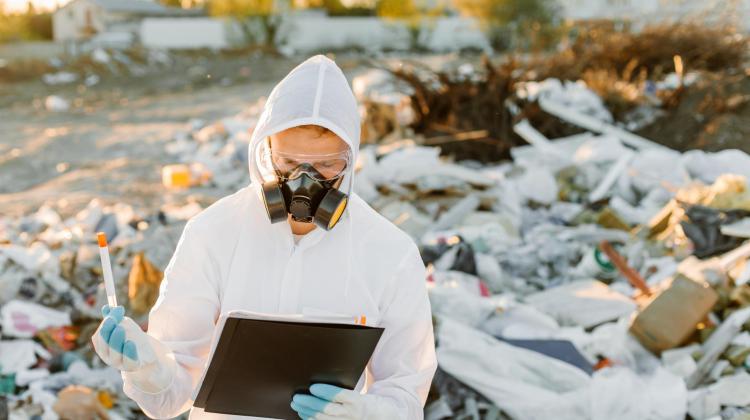Why is that so?
Because recycling is not profitable. Dump owners can make as much as 200 zł on each tonne of the waste they receive. Take Zgierz for example where almost 50 thousand tonnes of waste have been dumped at the site of the former Boruta chemical plant. It is easy to compute that the profit amounts to almost 10 million zł.
A new statutory law on waste (Journal of Laws of 2017, item 2422) has imposed an obligation on local governments to control waste but in most cases they have not been able to cope with the task. They sign agreements with waste collecting companies and do not care about what happens next with the waste. Waste frequently ends up in privately owned dumps because as it turns out it is quite easy for an average Jane or Joe to become an owner of one when he or she meets some reasonable requirements (according to GUS data, in 2016, 62.7% of municipal waste was collected by private companies).
Lately, increasing amounts of waste are imported to Poland from various European countries, mainly from Germany and Great Britain, although a complete list of exporters, also outside the European Union, is much longer (Fig. 1). What is interesting is the fact that China, which until recently was the recipient of this ‘Pandora’s box’, has significantly limited the import of waste due to environmental concerns.
The problem becomes even more serious when waste catches fire and starts to burn
According to the Ministry of Environment, in 2018, there have been 63 fires of rubbish dumps and landfills including 27 very large and large ones. Only in May of this year, 9 fires were reported (Fig. 2).
Trash is burned to make room for more waste or because it is highly insured against fire. But let us leave the politics aside and consider environmental impact.
Environmental protection
The recent fires in Poland involved municipal waste, tires, chemical substances, plastics and waste electronic equipment. What was released into the environment, then? The entire Mendeleev’s table! Apart from heavy metals, there were also polycyclic aromatic hydrocarbons (PAHs), dioxins, furans and many other compounds we know to be highly cancerogenic, toxic, and teratogenic, which means that they may cause disturbances in the development of the fetus and malfunctioning of the endocrine system.
Restricting the time spent outdoors when the levels of air pollution are elevated due to burning fires is not enough to avoid contact with hazardous substances.
We need to be aware that the release of harmful compounds into the air is not the end of their impact. A portion of them may travel over large distances when airborne and pollute areas that are as far as several hundred kilometres away from the fire site. A portion will fall to the ground with rainfall to pollute the soil or change the acid-base conditions. The released pollutants may also contaminate water, which is particularly dangerous in the case of drinking water sources close to the disaster site. Taking into consideration that Regional Inspectorates of Environmental Protection responsible for the monitoring of surface water quality and air quality do not perform ongoing measurements of the concentration levels of hazardous substances, we can never know, leave alone rest assured, that the air that we breathe, the water we drink, and even the bio-crops we grow in our home gardens meet the standards set by law.
We may as well be experiencing adverse effects of last months’ events over the span of the next few years. How can we protect ourselves? And this is where we need to go back to politics. Only effective enforcement of law that regulates waste disposal and increasing the profitability of proper treatment of waste so that burning it is no longer lucrative can bring measurable results.






